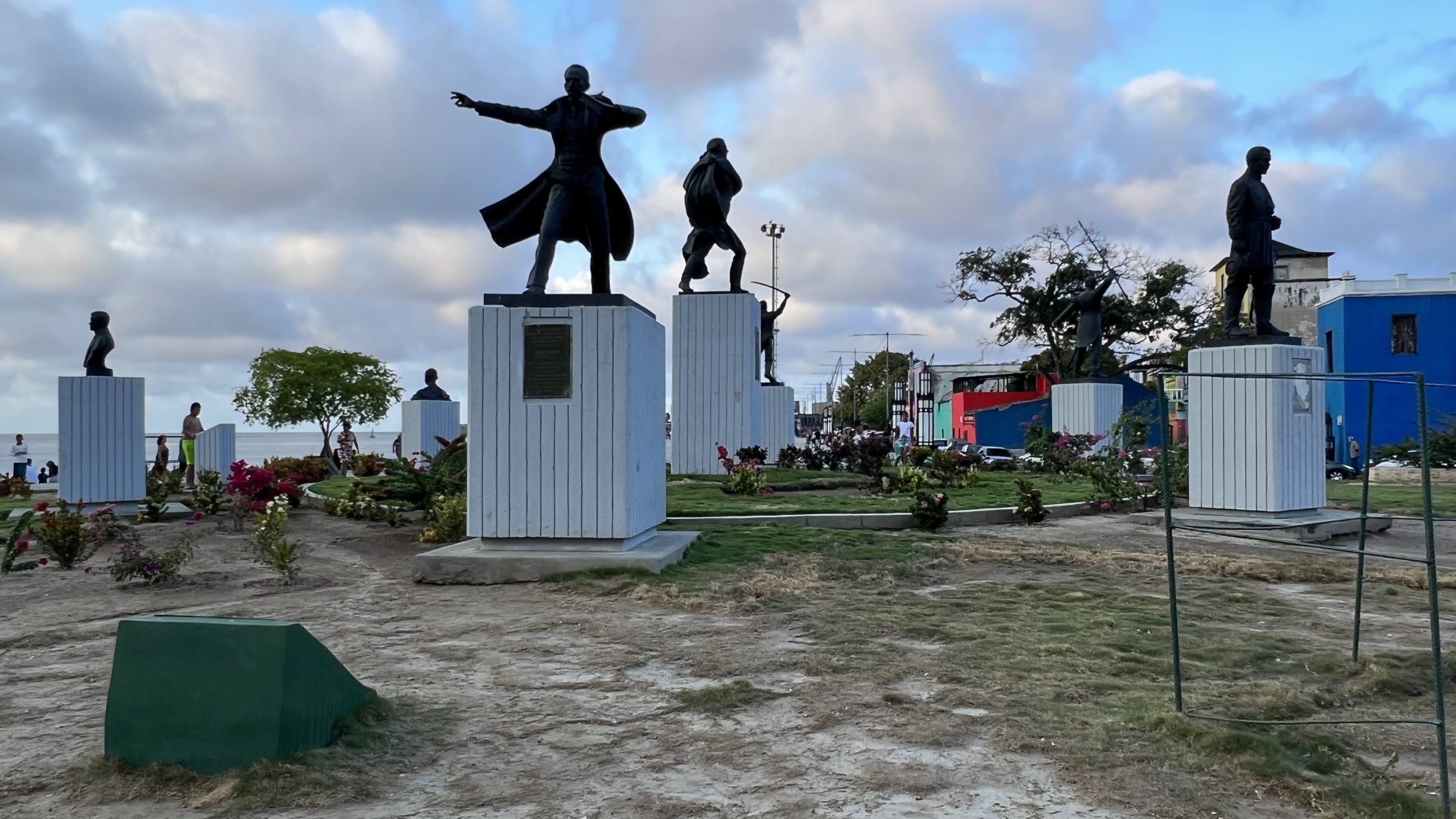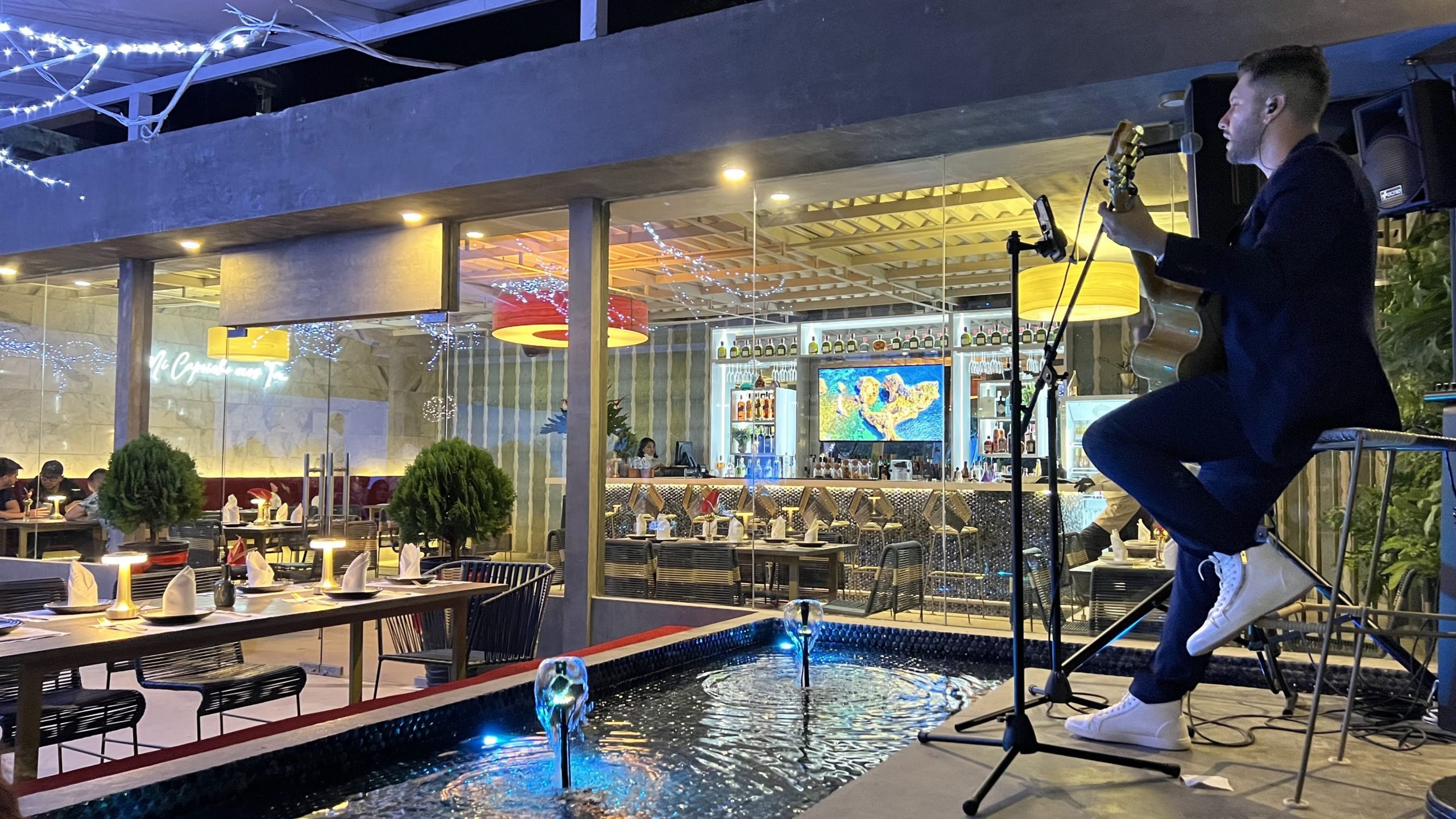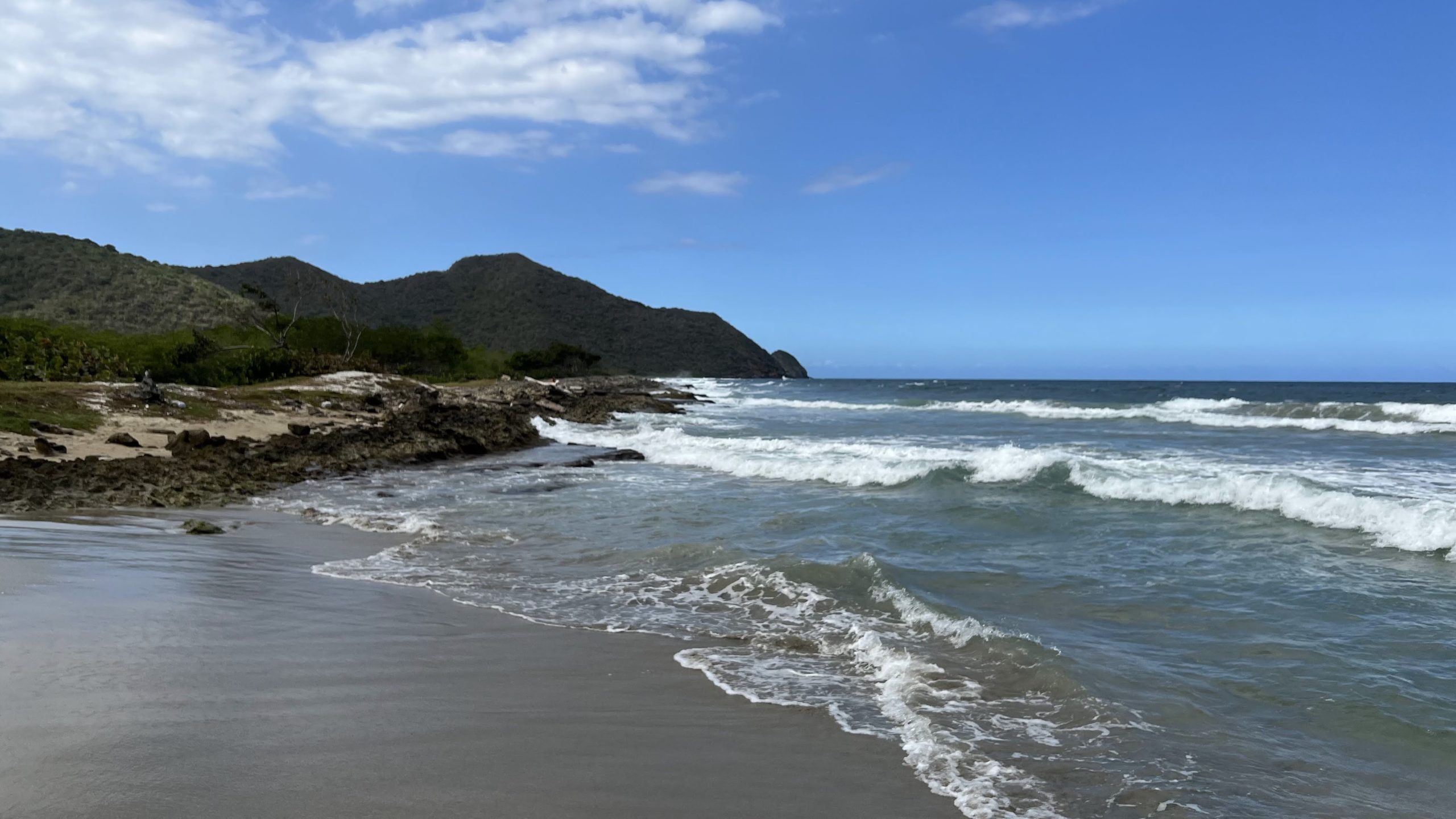Stranded in Draculand
Many things have changed in Valencia, Venezuela. Once a prosperous industrial city, now the turf of a governor with a Dracula complex


This square used to have the name of the country's first president. Now is just Plaza Dracula
Photo: Carlos Sevilla
From what used to be my dad’s office, I can see the wood carving of Simón Bolívar that I gave him on his birthday in 2009. Time hasn’t washed up the color of the jacket. Now I’m sitting on the leather sofa where my dad used to watch the birds coming to eat, and I noticed that weeds are growing. However, the cacao tree is still growing in its corner and giving fruit, thanks to the weather and the generosity of the soil.
The rusty dome of the sort of observatory our neighbor built to see the Halley comet back in 1986 looms over the wall. I only remember that I went to watch a Venezuelan movie, La Generación Halley, at the cinema in La Viña with a bunch of noisy friends.
This is where my thoughts drifted and how I experienced the notion of time passing, a few days after I arrived in Valencia. I couldn’t go to my hometown in two years, the longest it had been. I know I’m lucky and privileged to be able to go back as long as finances, natural events, my health and now the pandemic allows me to do it. Many other friends that left don’t have a passport or have other priorities imposed by the realities of migration. They think it’s too risky to travel to Venezuela in the middle of a pandemic, with travel regulations changing so much at such short notice. I was later forced to confirm they were right.
Transylvania, Carabobo
Days before my trip, I found out that the U.S. demands a negative COVID-19 test taken no more than 24 hours prior in order to reenter the country. I wasn’t sure if any labs in Valencia could comply with this, so I asked my sister. Minutes later, she forwarded me the voice note of a lab analyst ensuring that, if I could be at the lab before 10:00 a.m. any given day, they would provide a PCR report in English and Spanish, with a QR code accepted globally and a wet stamp that very afternoon.
Great. Now I just needed a negative test to enter Venezuela, no older than 72 hours, and I had to work hard to get an appointment with all drive-thru testing sites in Miami fully booked five days before my flight. Florida was being hit by the omicron variant. Finally, I was tested and boarded my flight with an airline whose name is a source of mockery for my Venezuelan friends, Turpial Airlines, that I used in 2019 with acceptable satisfaction. I was happy to fly with them because they fly to Valencia from Santo Domingo, saving me the 500 dollars I might have had to pay for both cabs, one from Caracas to Valencia and one from Valencia to Caracas when I left.
Once I landed, I was greeted by a big official sign showing a red heart in the left, a drawing of a plane in the middle, and number ten inside an image of a bat. The bat is the emblem of eccentric governor Rafael “Dracula” Lacava; ten was the number his idol Diego Maradona used to have on his back. There was a line towards a cubicle where health personnel were taking molecular tests. They gave me a small piece of paper with a QR code to retrieve my results. The code was incomplete. My cousin Glenda told me later: “They never give those results.”
My first impression going through the cemetery of empty warehouses that is now Valencia’s industrial zone was that the streets were surprisingly clean.
“The General Motors plant was here, remember?” said my sister Subdelia. A well-lit food truck was selling hamburgers in the middle of nowhere, which showed the place was safe enough. No one would have thought about bringing a food truck to that street two years ago. Maybe the name on the food truck could explain it: Dracu Burger.
The bat sign I saw at the airport was everywhere in the city, way more ubiquitous than in 2019. The garbage trucks are called Trash Drácula, the fire trucks are Dracu Tankers, and you can see the bat on police cars, the gas station by the Guaparo roundabout, by the entrance of the Negra Hipólita park, and the old transit park for kids which is now called Dracu Park Vial. Even on the arc leading to the Casupo hiking trail. Cristóbal Mendoza Sq., where I used to go when I was a kid, is now called Plaza Drácula. When I saw it, I asked my nephew if he had ever been there: “No, Tito didn’t like it,” he said, remembering my dad, his grandpa, with a hint of nostalgia in his voice.
Makes No Sense at All
There are so many abandoned houses in Valencia’s middle-class neighborhoods, mostly because of massive migration. Many of them have “for sale” signs. Others seem to be left to rot by owners unable to keep up with the costs of maintenance.
When my dad bought our house, we could see Hotel Intercontinental over a hill. When I was a kid, they drove me there to get my swimming lessons, and I loved the smell in the lobby, a mix of scent spray, cleaning products, and expensive perfume. When the Intercontinental chain left the country and the hotel became the state-owned Venetur Valencia, an aura of decay started to take over. During that time, boxer Inca Valero appeared one night in the lobby with his hands dripping blood, to say he had just killed his wife in a room.
The now called Hotel Internacional Valencia has a new entrance with a sanitizing tunnel and a metal detector. The former halls for conferences and parties are now a casino. They said they had 21 available rooms, “70 dollars for the single, 80 for the double.” In the hall leading to the exit, there’s a painting titled Pokerstar, where Tony Montana, Vincent Vega, Don Corleone, Al Capone, and Walter White, among other fictional villains, sit at a casino table.
“We’re going to a place in downtown you’re going to love. It’s a surprise,” said my sister on my second day in Valencia. With her extensive networks, she coordinated a visit to a salumeria in Valencia’s historical district, founded by a group of businesspeople with a long history of investing in the city. “People see such an investment and jump to think they are enchufados, without wanting to know who they are, what their background is.”
They rebuilt a 19th century house, three blocks from Teatro Municipal, and turned it into a trattoria and a store for their cured meats and fresh pasta. My sister is optimistic about the renovation of the historic district and the chances of attracting tourists and creating jobs. My niece says: “You are so positive. You are like a Herbalife motivator. Positive all the time.” My sister replied: “I have no other option.”
Another day we went to Patanemo, a spectacular bay near Puerto Cabello and Borburata. To access the parking lot, we gave a one-dollar bill, the most sought-after bill in Venezuela, to a little girl who carried a notebook. She wasn’t there when we came back two days later. We also stopped in Puerto Cabello, where governor Dracula started his political career as a mayor, and found a Plaza Drácula by the marina, with statues of Cuban hero José Martí, Francisco de Miranda, and Mahatma Gandhi (Lacava ordered another one of his idol, the late soccer star and chavista supporter Diego Maradona, for the sports complex).

The statues in a Puerto Cabello square face the Caribbean breeze
Photo: Carlos Sevilla
Back in Valencia, I found restaurants as good as any in Miami. One of my cousins, a dentist, says that “here, we’re all chasing that 7%,” talking about the percentage of the population that isn’t poor. My mom, a retired teacher with a long career says: “If it weren’t for you and your sister, I’d have starved to death.”
For my farewell dinner, we went to a restaurant located in what used to be part of a school many years ago. It’s a very nice place, under a thick canopy of trees and impeccable design. “Look at those sugar daddies,” my sister said. Three men in their sixties were drinking scotch, wine, and cocktails with three young women. The restaurant’s singer sang Ojalá, an old hit by Cuban songwriter Silvio Rodríguez, with no sense of irony. But soon, the girls asked him to sing another thing that had nothing to do with the official playlist of the Cuban revolution.
My pal César—who lives in Tenerife and has bitter memories of his last visit to Venezuela—says the country has an economy that makes “no sense at all.”

This singer brought into a bizarre context the austere folk songs of the Cuban revolution
Photo: Carlos Sevilla
Positive
One day before my return flight, I went to the lab of the analyst whose perfect diction in the voice note had made me trust her. At 60 dollars, the PCR test was the most expensive, but I decided that was the one I wanted. I was there in the morning and in the afternoon the result was ready, as promised. “The analyzed sample is positive for ARN from SARS-COV2,” it read.
My sister, who must have commanded a Roman legion in a previous reincarnation, immediately sent me to my parent’s empty house. César, a microbiologist, explained to me that symptoms in vaccinated people like me are mild but with a high infection potential, so I should stay away from planes. Luckily for me, I was working remotely since the pandemic started, so I could work from Valencia… theoretically. According to the state telecom company CANTV, the problem was that ABA services at my parents’ house had ceased to work years ago after the cables were stolen.
My alternative was to pay for prepaid wireless internet with Digitel, which must be paid in bolivars, roughly the equivalent to $8 a day. Too much and too difficult, especially because getting bolivars is one of the most stressful tasks in Venezuela (please don’t make me explain it).
Five days later, I took an antigen test and it was positive again. On January 17th, Martin Luther King Jr. Day, I was frustrated enough to tell my sister I could spend that U.S. holiday trying to find a new router, and stop depending on the unstable and expensive prepaid service I was using. My contagious phase was over, and I could move my “office” to my sister’s patio. The noise of green parrots would become a staple of my Zoom calls.
The Sunken Ship
One morning, walking to my sister’s, I saw a parked truck with a sign reading Dracualumbra. I stopped to take a picture to share it with my friend Bartolomé, a fan of gothic literature who enjoys all those Dracula references in Valencia and the mix up with the Batman imaginary, and a lady came over and asked me if I lived here. I pointed at my mom’s house. “That’s Subdelia’s house,” she said. “Exactly,” I replied. “Are you Subdelia’s son?” she asked. When I said I was, she said “but you don’t look like your sister.” “Some people think the opposite.
In the six cities I’ve lived during my two periods as an immigrant in the U.S., I’ve strolled through neighborhoods of several-million-dollar houses and I was never asked what I was doing there. Now I’m considered a stranger in the streets where I learned to walk. I remembered those stories of immigrants who are back at their hometowns and feel as foreigners.
In the last week of January, I had the fifth test and finally, I was negative, so I could reschedule my return to Miami. Our contact at the airline told us that I needed another antigen test the day before the flight. The previous Sunday, we went to C.R.P.U., a beach club from the ‘60s. From its beach, you can see Isla Larga, where a ship sank decades ago. I know its name thanks to the father of a friend, a retired Navy officer: Sesostris. The sea was as calm and beautiful as in my best childhood memories. Nature has been really generous with Venezuela.
After a total of six tests and almost 200 dollars spent in labs, I was back at the airport when the airline personnel asked for my PCR test.
I produced a printed sheet with the result of my antigen test, the one they required by phone, but no one seemed to see the difference. In Santo Domingo, standing in line to check-in for the flight to Miami, an employee asked for a document I knew nothing about. “What’s that for?” I asked. “A sworn declaration stating you don’t have covid.” When I said I didn’t have it, he replied it didn’t matter.
Three weeks after my original return date, when I landed in Miami, I remembered the Simón Bolívar statuette on my folks’ patio, which seemed to be looking over the horizon, as if meditating on abstractions like freedom, sovereignty, or the Gran Colombia. Or maybe on how to connect the Battle of Carabobo with Dracula. Not an easy task; my gaze wanders off as well, trying to find the link.
I thought about my dad, who didn’t live to witness the global chaos caused by the pandemic, and how it has brought up the good and the bad in so many of us. I remembered him sitting at my sister’s house entrance, playing the cuatro and saying one of his recurring phrases: “People die when their time has come.”

Patanemo bay. In Venezuela, nature always relieves you of what politics and society make you suffer
Photo: Carlos Sevilla
Caracas Chronicles is 100% reader-supported.
We’ve been able to hang on for 22 years in one of the craziest media landscapes in the world. We’ve seen different media outlets in Venezuela (and abroad) closing shop, something we’re looking to avoid at all costs. Your collaboration goes a long way in helping us weather the storm.
Donate



